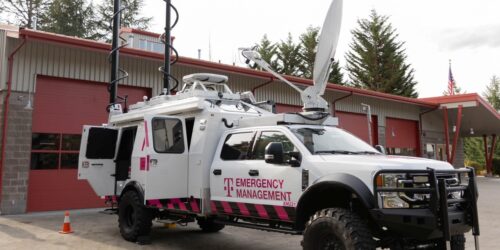Almost two decades ago, the United States Congress recognized that state and local barriers to infrastructure investment would have to be removed if the United States was to retain its leadership role in the deployment of advanced telecommunications services. To provide the advanced wireless services that consumers demand, wireless telecommunications providers must deploy increasingly tightly stitched networks of equipment, such as towers and antennas, to reach the places where consumers live and work. Local governments, however, often impede deployment of necessary infrastructure by requiring multiple hearings and imposing unnecessary procedures solely on wireless permit applications.
Congress enacted the Telecommunications Act of 1996 (“1996 Act”), at least in part, to address this problem, aiming “to promote competition and higher quality in American telecommunications services and to ‘encourage the rapid deployment of new telecommunications technologies.’” In particular, the 1996 Act radically altered the communications markets and their regulation by imposing limitations on the traditional authority of state and local governments to regulate the location, construction, and modification of telecommunications facilities.
Notwithstanding Congress’ efforts to streamline the siting of wireless facilities, there remain a number of time-consuming and expensive processes a wireless carrier must go through before it can deploy infrastructure, including entering into private arrangements to gain access to the land or structure, obtaining siting approval from the governing local municipality, and complying with federal environmental, historic and Native American cultural site preservation statutes and regulations. T-Mobile does not object to these processes and agrees they serve important public interests but, as Congress and the Federal Communications Commission (FCC) have emphasized, they should only delay the deployment of wireless infrastructure to the extent necessary to achieve the stated policy and legal objectives.
In 2009, for instance, the FCC established presumptive timeframes for state and local processing of wireless tower and antenna siting requests, and in 2011, it adopted an order aimed at ensuring timely and rationally priced access to utility poles. In addition, the FCC commenced a rulemaking proceeding last year on, among other things, expediting environmental review processes in connection with proposed deployments of small-scale wireless technologies, and clarifying a 2012 Congressional requirement that state and local governments shall approve carrier modification requests for any eligible facilities that do not substantially change the physical dimensions of the tower or base station.
Although the FCC has respected the role of municipalities in the siting process and its actions have been well within the bounds set by Congress, a number of cities and towns across the country continue to find ways to delay or halt altogether the deployment of wireless infrastructure. For example, some impose arbitrary restrictions on the number of carriers that can put antennas on a single tower, while others require multiple public hearings for the upgrade and replacement of existing antennas or charge thousands of dollars for a simple permit to switch out copper wires for fiber optic facilities. These burdensome regulatory requirements often are applicable solely to permits sought by wireless carriers.
Congress clearly expected the 1996 Act to facilitate the deployment of wireless infrastructure, but some local governments continue to find ways to cause delays. This is illustrated by the City of Roswell, Georgia’s 2010 denial of T-Mobile’s application to install a “mono-pine” tower via a three-line letter that simply referred to a 108-page public hearing transcript. The letter did not otherwise specify any reason for the denial. While one lower court agreed with T-Mobile that the statutory requirement that a denial must be “in writing and supported by substantial evidence” means the decision must actually contain the bases for the denial, the court of appeals ruled that the city's letter was sufficient. Last month, four years after the city sent its letter denying T-Mobile’s application, the U.S. Supreme Court has agreed to hear the case, and clarify for carriers and municipalities nationwide what Congress meant by its directive.
As the FCC has made clear, wireless services and the networks they ride on are central to the economic, civic, and social lives of over 300 million Americans. Robust wireless networks also have become necessary for public safety, allowing mobile 911 callers to summon help, and first responders to communicate effectively, during emergencies. We cannot afford to let towns and cities unreasonably impede carriers’ attempts to provide better coverage, faster downloads, and new technologies, especially when it is their own residents demanding the improvements.




